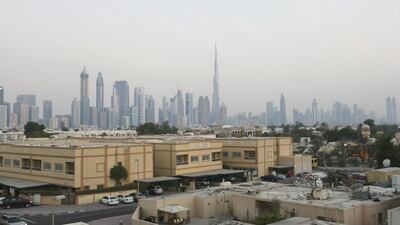Dubai’s residential property market is heading for a “soft landing”, with a flattening of prices expected for the remainder of this year ahead of a likely increase next year, according to Knight Frank.
The property consultancy’s latest Inside View report released yesterday says that after “a period of restraint” caused by lower oil prices and weaker investor sentiment, it expects a gradual recovery in the market next year, with sentiment improving as a result of greater government infrastructure spending ahead of Expo 2020.
“While we have seen a slowdown in demand for residential property in Dubai over the past 18 months, appetite remains healthy and is expected to rebound over the next couple of years as investors regain their confidence,” said Dana Salbak, the head of research at Knight Frank Middle East. “The real estate market is more mature, and this resilience will drive the next growth cycle.”
Despite a 7 per cent year-on-year price decline in the first half of this year, and a 12 per cent drop in transaction values to Dh113bn, the consultancy expects demand to be led by “properties undertaken by reputed developers”, especially for off-plan schemes.
“We also see active demand for properties within developed master plans. Whether existing or under construction, projects in amenity-equipped locations continue to build interest,” said Ms Salbak.
However, the report issued a caveat stating that the outlook for Dubai in general, and its property market in particular, depends “on a number of global and regional fundamentals”. Further volatility in oil prices, continuing geopolitical tensions and the forthcoming US presidential elections could all affect currency markets, which in turn would affect investor sentiment and demand for property.
“Dubai’s position as a leading financial hub and competitive tourist destination leaves it exposed and vulnerable to global events,” said Ms Salbak.
Meanwhile, an analysts’ report from Egyptian investment bank EFG Hermes is slightly less upbeat and is predicting a further decline in property prices of 5 per cent this year and into early in next year, before stabilising later in 2017.
“The number of transactions are also expected to slow down further,” the report said. That will translate not only into price declines for completed properties but also fewer new launches than have been experienced over the past three years.
EFG Hermes expects 33,500 new units to be completed in Dubai between now and 2019, although the forecasted pipeline is 74,200 until the end of 2018, according to Reidin figures. Buying activity continues to be dampened by the strong dollar to which the dirham is pegged, the weak oil price and challenging economic conditions in Saudi Arabia. Saudis are the second-biggest group of foreigners after Indians investing in Dubai property, according to Knight Frank. They are responsible for 7 per cent of all UAE property purchases, according to EFG Hermes.
EFG Hermes said that Emaar Properties was likely to continue outperforming the market, partly because most of its buyers are UAE residents and that the company’s properties achieve higher prices on the secondary market. It also expects Aldar to do well but said that Damac faces a tougher environment as it has fewer sources of recurring revenue and is more reliant on property sales.
Damac’s contracted sales were 29 per cent lower in the first half of this year, and EFG Hermes is forecasting that between this year and 2018 the developer’s sales will be 28 per cent lower than last year. It said that Damac has historically sold a high concentration of properties to buyers from the GCC who “we believe may show relatively lower appetite for real estate investment in the short term”.
mfahy@thenational.ae
Follow The National's Business section on Twitter


